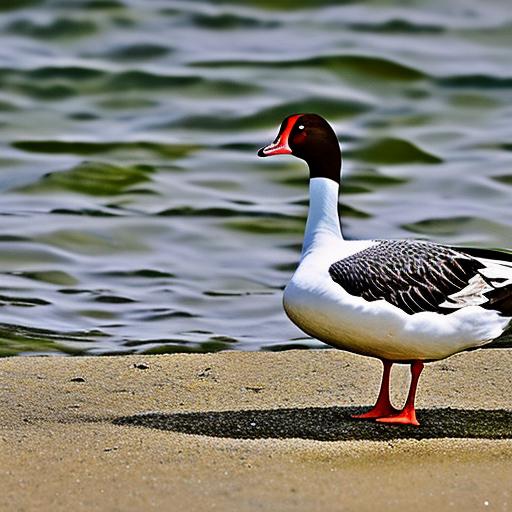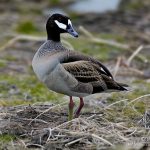Geese are a common sight on beaches, and their presence can have both positive and negative impacts. Understanding and managing geese behavior on beaches is important for maintaining the ecological balance and ensuring the safety of beachgoers. This article will provide a comprehensive overview of geese behavior on beaches, the types of geese that frequent these areas, the reasons why they visit, their impact on beach ecology and safety, and various methods for deterring them.
Key Takeaways
- Geese are attracted to beaches because they offer food, water, and shelter.
- Different types of geese, such as Canada geese and snow geese, can be found on beaches.
- Geese can negatively impact beach ecology and safety by leaving droppings and aggressive behavior.
- Natural methods, such as planting tall grasses and using decoys, can help keep geese away from beaches.
- Consistent maintenance is crucial in deterring geese from beaches.
Understanding the behavior of geese on the beach
Geese have specific feeding habits on beaches, often foraging for grasses, seeds, and insects in the sand and vegetation. They are also known to feed on agricultural crops near beaches. Understanding their feeding habits can help in managing their presence by modifying food sources or implementing deterrents.
Nesting behavior is another important aspect of geese behavior on beaches. Geese prefer to nest in areas with tall grasses or shrubs near water bodies. They build nests out of plant materials and lay their eggs there. Understanding their nesting preferences can help in identifying potential nesting sites and implementing measures to discourage nesting.
Geese are social animals and communicate with each other through vocalizations and body language. They form strong pair bonds during breeding season and often travel in large flocks. Understanding their social behavior can help in developing effective management strategies that take into account their flock dynamics.
Identifying the types of geese that frequent beaches
Several species of geese can be found on beaches, but some are more common than others. The Canada goose is one of the most frequently encountered species on beaches, known for its distinctive black head and neck with a white chinstrap. Other common species include the snow goose, Ross’s goose, and Brant goose.
Each species has its own physical characteristics and behavior patterns. For example, Canada geese are known for their honking calls and aggressive behavior during nesting season. Snow geese, on the other hand, are known for their large flocks and distinctive white plumage. Understanding the characteristics and behavior of different species can help in developing targeted management strategies.
Analyzing the reasons why geese visit beaches
Geese visit beaches for various reasons, including food sources, nesting and breeding opportunities, and migration patterns. Beaches often provide a rich source of food for geese, with grasses and seeds readily available. They may also find agricultural crops near beaches to be attractive food sources.
Beaches with suitable nesting habitat can attract geese looking for a safe place to lay their eggs. Tall grasses and shrubs near water bodies provide ideal nesting sites for geese. Understanding their nesting preferences can help in identifying potential nesting areas and implementing measures to discourage nesting.
Migration patterns also play a role in geese visiting beaches. Some species of geese use beaches as stopover sites during their long-distance migrations. These sites provide them with rest and refueling opportunities before continuing their journey. Understanding migration patterns can help in managing geese presence on beaches during specific times of the year.
The impact of geese on beach ecology and safety
While geese can be a natural part of beach ecosystems, their presence can also have negative impacts. Geese feeding on vegetation can cause damage to dunes and other sensitive habitats. Their droppings can contribute to nutrient loading in water bodies, leading to algal blooms and poor water quality.
Geese droppings also pose health risks to humans and other animals. They can contain bacteria such as E. coli, which can cause gastrointestinal illnesses. In addition, goose droppings can make walking on the beach unpleasant and create safety hazards for beachgoers.
The legalities of deterring geese from beaches

Managing geese presence on beaches often requires permits and compliance with regulations. Many jurisdictions have specific guidelines for goose management, including the use of deterrents and barriers. It is important to be aware of these regulations and obtain the necessary permits before implementing any management strategies.
Ethical considerations should also be taken into account when deterring geese from beaches. Humane methods should be used to ensure the well-being of the geese while still achieving the desired outcome. This may include using non-lethal deterrents and avoiding harm to other wildlife.
Natural methods for keeping geese away from the beach
There are several natural methods that can be used to deter geese from beaches. Habitat modification and landscaping can make beaches less attractive to geese by removing or altering their preferred nesting and feeding areas. This can include planting native vegetation that is less appealing to geese or creating barriers with rocks or driftwood.
Repellents and deterrents made from natural ingredients can also be effective in keeping geese away from beaches. These can include sprays or granules that emit odors or tastes that are unpleasant to geese. Some examples include garlic-based repellents or hot pepper sprays.
Predator decoys and visual cues can also be used to deter geese from beaches. The presence of decoys such as plastic owls or coyotes can create the illusion of a predator and discourage geese from landing or nesting. Visual cues such as reflective tape or scare balloons can also be effective in deterring geese.
The effectiveness of physical barriers in deterring geese
Physical barriers can be an effective method for deterring geese from beaches. There are several types of barriers that can be used, including fences, netting, and grids. These barriers prevent geese from accessing the beach and nesting areas, reducing their presence.
However, there are pros and cons to using physical barriers. While they can be effective in keeping geese away, they may also impact other wildlife and disrupt natural processes. Careful consideration should be given to the installation and maintenance of barriers to minimize these impacts.
The role of audio and visual deterrents in keeping geese off the beach
Audio and visual deterrents can be effective in keeping geese off the beach. Sound devices that emit distress calls or predator sounds can create a sense of danger and discourage geese from landing or nesting. Light devices that flash or move can also be effective in deterring geese.
Placement and timing considerations are important when using audio and visual deterrents. They should be strategically placed to cover the areas where geese are likely to land or nest. Timing should also take into account the breeding season and migration patterns of geese.
Using trained dogs to keep geese away from the beach
Trained dogs can be an effective tool for goose management on beaches. Dogs can be trained to chase geese away without causing harm, creating a natural deterrent. However, there are limitations to using dogs, as they require proper training and certification to ensure their effectiveness and safety.
Training and certification requirements for using dogs in goose management should be followed to ensure proper handling and humane treatment of the animals. Dogs should be trained to respond to specific commands and cues, and their behavior should be closely monitored during operations.
The importance of consistent maintenance in deterring geese from beaches
Consistent maintenance is crucial for the long-term success of goose management on beaches. Regular monitoring and evaluation of management strategies can help in identifying any issues or areas for improvement. Ongoing maintenance of barriers, deterrents, and other management tools is necessary to ensure their effectiveness.
Collaboration with other stakeholders, such as local authorities, conservation organizations, and beachgoers, is also important for long-term success. By working together, stakeholders can share knowledge, resources, and responsibilities to ensure responsible goose management on beaches.
Geese behavior on beaches is complex and understanding it is crucial for effective management. By identifying the types of geese that frequent beaches, analyzing the reasons why they visit, and assessing their impact on beach ecology and safety, appropriate management strategies can be developed. Natural methods, physical barriers, audio and visual deterrents, and trained dogs can all be effective tools in deterring geese from beaches. Consistent maintenance and collaboration with stakeholders are key to long-term success. Responsible goose management on beaches is essential for maintaining the ecological balance and ensuring the safety of beachgoers.
If you’re looking for effective ways to keep geese off your beach, you might also be interested in learning about the benefits of raising chickens. Poultry Wizard offers a comprehensive guide on how to keep chickens and provides valuable information on topics such as coop size requirements. To find out more about how big a coop needs to be for a chicken, check out their article here. Additionally, if you’re considering keeping guinea fowl alongside chickens, Poultry Wizard has an informative article that explores whether guinea fowl can live with chickens. Discover the answer and gain insights by visiting this link.
FAQs
What are some common problems caused by geese on beaches?
Geese can cause a number of problems on beaches, including leaving droppings that can be unsightly and unsanitary, damaging vegetation, and potentially attacking beachgoers.
What are some natural ways to keep geese off my beach?
Some natural ways to keep geese off your beach include planting tall grasses or other vegetation that geese don’t like, using decoys or scarecrows, and using noise-making devices like air horns or whistles.
What are some non-natural ways to keep geese off my beach?
Non-natural ways to keep geese off your beach include using physical barriers like fences or netting, using chemical repellents, and hiring professional wildlife control services.
Is it legal to harm or kill geese to keep them off my beach?
In most cases, it is illegal to harm or kill geese to keep them off your beach. It is important to check with your local wildlife agency to determine what methods are legal and safe to use.
What should I do if I encounter an aggressive goose on my beach?
If you encounter an aggressive goose on your beach, it is important to stay calm and avoid making sudden movements. Slowly back away from the goose and give it plenty of space. If the goose continues to be aggressive, seek help from a wildlife professional.
Meet Walter, the feathered-friend fanatic of Florida! Nestled in the sunshine state, Walter struts through life with his feathered companions, clucking his way to happiness. With a coop that’s fancier than a five-star hotel, he’s the Don Juan of the chicken world. When he’s not teaching his hens to do the cha-cha, you’ll find him in a heated debate with his prized rooster, Sir Clucks-a-Lot. Walter’s poultry passion is no yolk; he’s the sunny-side-up guy you never knew you needed in your flock of friends!







